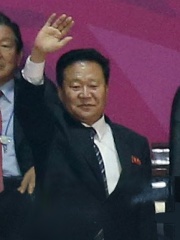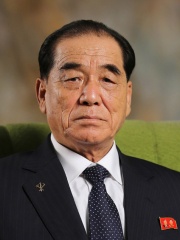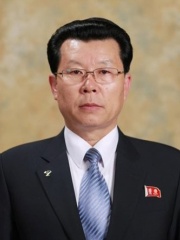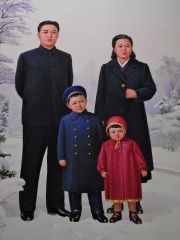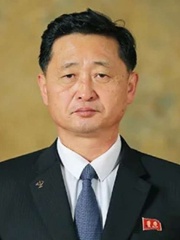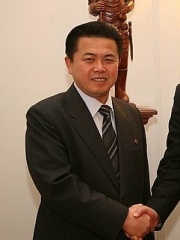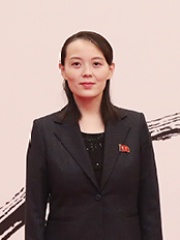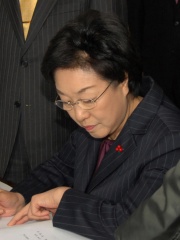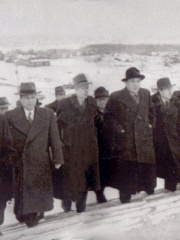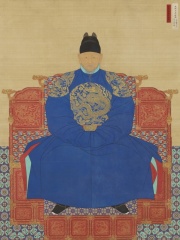
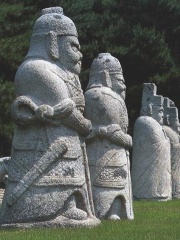
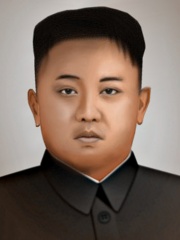
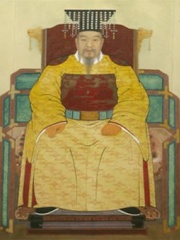


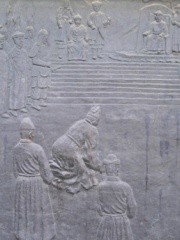
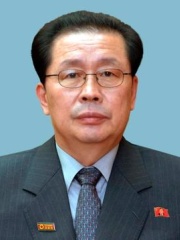
The Most Famous
POLITICIANS from North Korea
This page contains a list of the greatest North Korean Politicians. The pantheon dataset contains 19,576 Politicians, 89 of which were born in North Korea. This makes North Korea the birth place of the 42nd most number of Politicians behind Argentina, and Peru.
Top 10
The following people are considered by Pantheon to be the top 10 most legendary North Korean Politicians of all time. This list of famous North Korean Politicians is sorted by HPI (Historical Popularity Index), a metric that aggregates information on a biography's online popularity. Visit the rankings page to view the entire list of North Korean Politicians.

1. Taejo of Joseon (1335 - 1408)
With an HPI of 78.12, Taejo of Joseon is the most famous North Korean Politician. His biography has been translated into 46 different languages on wikipedia.
Taejo (4 November 1335 – 27 June 1408), personal name Yi Sŏnggye, later changed to Yi Tan, was the founder and first monarch of the Joseon dynasty of Korea. After overthrowing the Goryeo dynasty, he ascended to the throne in 1392 and abdicated six years later during a strife between his sons. He was honored as Emperor Ko following the establishment of the Korean Empire. Taejo emphasized continuity over change. No new institutions were created, and no massive purges occurred during his reign. His new dynasty was largely dominated by the same ruling families and officials that had served the previous regime. He re-established amicable ties with Japan and improved relations with Ming China.

2. Taejong of Joseon (1367 - 1422)
With an HPI of 77.28, Taejong of Joseon is the 2nd most famous North Korean Politician. His biography has been translated into 35 different languages.
Taejong (Korean: 태종; Hanja: 太宗; 16 May 1367 – 10 May 1422), personal name Yi Pangwŏn (이방원; 李芳遠), was the third monarch of the Joseon dynasty of Korea and the father of Sejong the Great. He was the fifth son of King Taejo, the founder of the dynasty. Before ascending to the throne, he was known as Grand Prince Jeongan (정안군; 靖安君).

3. Kim Jong-un (b. 1983)
With an HPI of 77.19, Kim Jong-un is the 3rd most famous North Korean Politician. His biography has been translated into 138 different languages.
Kim Jong Un (born 8 January 1984) is the supreme leader of North Korea, and general secretary of the Workers' Party of Korea (WPK). A member of the Kim family, he is the third son of Kim Jong Il, his predecessor as supreme leader, and a grandson of Kim Il Sung, the founder of North Korea. He is the third supreme leader of North Korea, and also serves as the president of the State Affairs Commission and the chairman of the Central Military Commission. From late 2010, Kim was viewed as the successor to the North Korean leadership. Following his father's death in December 2011, state television announced Kim as the "great successor to the revolutionary cause". He assumed various leadership posts, and also became member of the Presidium of the WPK Politburo, the highest decision-making body in the country. In July 2012, Kim was promoted to the highest rank of marshal in the Korean People's Army, consolidating his positions as commander-in-chief of the Armed Forces and Chairman of the Central Military Commission. Like his father and grandfather before him, Kim Jong Un rules North Korea as a totalitarian personalist dictatorship, and his leadership has maintained the Kim family cult of personality. State media often refer to him as "Respected Comrade" or "Marshal". Kim's regime has been accused of human rights violations. He reportedly ordered the purge and execution of several North Korean officials including his uncle, Jang Song-thaek, in 2013. He is also widely believed to have ordered the assassination of his half-brother, Kim Jong-nam, in Malaysia in 2017. Kim Jong Un's ideology departed from his father's military-first Songun policy, professing a "people-first policy" and renewed commitment to communism. Kim revived the Kim Il Sung-era pyŏngjin policy, of parallel development of the country's economy and military, focusing on its nuclear weapons program. He has also revived the structures of the WPK, expanding the party's power at the expense of the military leadership. Kim oversaw four nuclear weapons tests and extensive missile tests, including its first intercontinental ballistic missile. These heightened tensions with South Korea, the United States, and China, culminating in the 2017–2018 North Korea crisis. In 2018 and 2019, Kim took part in summits with South Korean president Moon Jae-in and U.S. president Donald Trump, the first meetings between a North Korean and a U.S. head of state. Despite the brief thaw in relations, the negotiations ultimately broke down without progress on reunification of Korea or nuclear disarmament. He has claimed success in combating the COVID-19 pandemic, as the country did not report any confirmed cases until May 2022, although several independent observers have questioned this claim. In December 2023, Kim declared that North Korea formally abandoned efforts to reunify Korea. In June 2024, Kim signed a security and defense treaty with Russia, while supplying Russia materiel for the Russo-Ukrainian war. In October, North Korea sent soldiers to the assist Russian units in the Kursk campaign.

4. Taejo of Goryeo (877 - 943)
With an HPI of 75.62, Taejo of Goryeo is the 4th most famous North Korean Politician. His biography has been translated into 38 different languages.
Taejo (Korean: 태조; Hanja: 太祖; 31 January 877 – 4 July 943), personal name Wang Kŏn (왕건; 王建), also known as Taejo Wang Kŏn (태조 왕건; 太祖 王建; lit. 'Great Progenitor Wang Kŏn'), was the founder of the Goryeo Dynasty of Korea. He ruled from 918 to 943, achieving unification of the Later Three Kingdoms in 936.
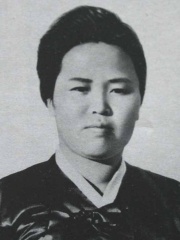
5. Kim Jong-suk (1919 - 1949)
With an HPI of 74.46, Kim Jong-suk is the 5th most famous North Korean Politician. Her biography has been translated into 36 different languages.
Kim Jong-suk (Korean: 김정숙; Hancha: 金正淑; 24 December 1917 – 22 September 1949) was a Korean revolutionary, anti-Japanese guerrilla, Communist activist, the first wife of North Korean leader Kim Il Sung, the mother of former leader Kim Jong Il and grandmother of current leader Kim Jong Un.

6. Gwangjong of Goryeo (925 - 975)
With an HPI of 74.16, Gwangjong of Goryeo is the 6th most famous North Korean Politician. His biography has been translated into 32 different languages.
Gwangjong (925 – 4 July 975), personal name Wang So, was the fourth monarch of the Goryeo dynasty of Korea.

7. Jeongjong of Joseon (1357 - 1419)
With an HPI of 73.36, Jeongjong of Joseon is the 7th most famous North Korean Politician. His biography has been translated into 31 different languages.
Jeongjong (Korean: 정종; Hanja: 定宗; 1 July 1357 – 26 September 1419), personal name Yi Bang-gwa (이방과; 李芳果), later Yi Gyeong (이경; 李曔), was the second monarch of the Joseon of Korea. He was the second son of King Taejo, the founder of the dynasty. Before ascending to the throne, he was known as Grand Prince Yeongan (영안군; 永安君).

8. Injo of Joseon (1595 - 1649)
With an HPI of 71.95, Injo of Joseon is the 8th most famous North Korean Politician. His biography has been translated into 25 different languages.
Injo (Korean: 인조; Hanja: 仁祖; 7 December 1595 – 17 June 1649), personal name Yi Jong (이종; 李倧), was the 16th monarch of the Joseon dynasty of Korea. He was a grandson of King Seonjo and the eldest son of Prince Jeongwon. He ascended to the throne after leading a coup d'état against his uncle, Gwanghaegun, in 1623. Today, Injo is considered a weak and incompetent king, as during his reign the country experienced Yi Gwal's Rebellion, the Later Jin invasion, the Qing invasion, and an economic recession, while the government was corrupt and ineffective.

9. Jang Song-thaek (1946 - 2013)
With an HPI of 71.59, Jang Song-thaek is the 9th most famous North Korean Politician. His biography has been translated into 36 different languages.
Jang Song-thaek (January or February 1946 – 12 December 2013) was a North Korean politician. He was married to Kim Kyong-hui, the only daughter of North Korean premier Kim Il Sung and his first wife Kim Jong Suk, and only sister of North Korean general secretary Kim Jong Il. He was therefore the uncle of the current leader of North Korea, Kim Jong Un, by marriage. The extent of Jang Song-thaek's power and position has not been confirmed in the West. However, in 2008 South Korean government officials and academic North Korea experts suggested that he had de facto leadership over North Korea while Kim Jong Il's health was declining and when Kim subsequently died. Jang was a vice-chairman of the National Defence Commission, a position considered second only to that of the supreme leader. He is believed to have been promoted to four-star general around the time of Kim Jong Il's death in December 2011, as his first appearance in uniform was while visiting Kim lying in state. Jang was considered a "key policy adviser" to Kim Jong Un. In December 2013, Jang was abruptly accused of being a counter-revolutionary and was stripped of all his posts and expelled from the Workers' Party of Korea (WPK). His photos were removed from official media and his image digitally removed from photos with other North Korean leaders. On 13 December, North Korean state media announced he had been executed by firing squad.
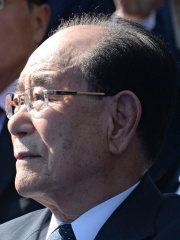
10. Kim Yong-nam (1928 - 2025)
With an HPI of 71.25, Kim Yong-nam is the 10th most famous North Korean Politician. His biography has been translated into 41 different languages.
Kim Yong-nam (Korean: 김영남; February 4, 1928 – November 3, 2025) was a North Korean politician who served as the president of the Presidium of the Supreme People's Assembly of North Korea, from 1998 until 2019. Due to holding the office, he was considered the head of state of North Korea; the country's constitution was amended once he left office in 2019 to transfer this position to the President of the State Affairs Commission, Kim Jong Un. Previously, he had served as Minister of Foreign Affairs from 1983 to 1998. He was elected a member of the Presidium of the Workers' Party of Korea (WPK) in 2010.
People
Pantheon has 89 people classified as North Korean politicians born between 38 BC and 1989. Of these 89, 25 (28.09%) of them are still alive today. The most famous living North Korean politicians include Kim Jong-un, Choe Ryong-hae, and Pak Pong-ju. The most famous deceased North Korean politicians include Taejo of Joseon, Taejong of Joseon, and Taejo of Goryeo. As of April 2024, 3 new North Korean politicians have been added to Pantheon including O Jong-ae, Kim Song-guk, and Yang Kyong-il.
Living North Korean Politicians
Go to all RankingsKim Jong-un
1983 - Present
HPI: 77.19
Choe Ryong-hae
1950 - Present
HPI: 69.55
Pak Pong-ju
1939 - Present
HPI: 67.32
Kim Yong-il
1944 - Present
HPI: 67.22
Kim Jae-ryong
1939 - Present
HPI: 66.53
Choe Yong-rim
1930 - Present
HPI: 66.39
Kim Kyong-hui
1946 - Present
HPI: 66.35
Kim Tok-hun
1961 - Present
HPI: 66.18
Kim Pyong-il
1954 - Present
HPI: 65.37
Kim Yo-jong
1988 - Present
HPI: 64.28
Kim Jong-chul
1981 - Present
HPI: 61.94
Han Myeong-sook
1944 - Present
HPI: 61.79
Deceased North Korean Politicians
Go to all RankingsTaejo of Joseon
1335 - 1408
HPI: 78.12
Taejong of Joseon
1367 - 1422
HPI: 77.28
Taejo of Goryeo
877 - 943
HPI: 75.62
Kim Jong-suk
1919 - 1949
HPI: 74.46
Gwangjong of Goryeo
925 - 975
HPI: 74.16
Jeongjong of Joseon
1357 - 1419
HPI: 73.36
Injo of Joseon
1595 - 1649
HPI: 71.95
Jang Song-thaek
1946 - 2013
HPI: 71.59
Kim Yong-nam
1928 - 2025
HPI: 71.25
Choe Yong-gon
1900 - 1976
HPI: 70.53
Jeongjong, 3rd monarch of Goryeo
923 - 949
HPI: 70.46
Gongyang of Goryeo
1345 - 1394
HPI: 69.50
Newly Added North Korean Politicians (2025)
Go to all RankingsO Jong-ae
1984 - Present
HPI: 36.65
Kim Song-guk
1984 - Present
HPI: 35.42
Yang Kyong-il
1989 - Present
HPI: 32.97
Overlapping Lives
Which Politicians were alive at the same time? This visualization shows the lifespans of the 15 most globally memorable Politicians since 1700.

